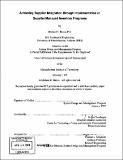| dc.contributor.advisor | Kirkor Bozdogan. | en_US |
| dc.contributor.author | Bravo, Michael H., 1959- | en_US |
| dc.date.accessioned | 2005-08-19T19:53:21Z | |
| dc.date.available | 2005-08-19T19:53:21Z | |
| dc.date.issued | 1999 | en_US |
| dc.identifier.uri | http://hdl.handle.net/1721.1/9746 | |
| dc.description | Thesis (S.M.)--Massachusetts Institute of Technology, System Design and Management Program, 1999. | en_US |
| dc.description | "February 1999." | en_US |
| dc.description | Includes bibliographical references (p. 116-118). | en_US |
| dc.description.abstract | Competitive market pressures and new dynamics in manufacturer-supplier relationships have led to the development of collaborative initiatives between manufacturers and suppliers that result in improved inventory management and material ordering practices. While these types of initiatives are known by different names in different industries, "vendor managed inventory'' (VMI) and "supplier managed inventory" (SMI) are designations typically used in traditional industrial settings. Similar programs have been successful in retail and grocery environments. This research seeks to determine the appropriateness of supplier managed inventory programs for use in industrial settings and the conditions under which their use offers significant benefits. A review of current literature regarding collaborative manufacturer-supplier initiatives is conducted as well as interviews with fifteen industrial companies regarding their experience with supplier managed inventory programs. Just-in-time (JIT) production and change management emerge as key supporting elements of an SMI initiative and are also discussed. The results from this research show that supplier managed inventory programs are being utilized in many different industrial settings with positive results. These results include improved inventory turns, higher service levels, reduced operating costs and mutually beneficial manufacturer-supplier partnerships. Benefits may vary between manufacturer and supplier companies. This research documents significant benefits associated with the implementation of SMI programs. A framework for implementing an SMI program is also provided. | en_US |
| dc.description.statementofresponsibility | by Michael H. Bravo. | en_US |
| dc.format.extent | 124 p. | en_US |
| dc.format.extent | 9690257 bytes | |
| dc.format.extent | 9690018 bytes | |
| dc.format.mimetype | application/pdf | |
| dc.format.mimetype | application/pdf | |
| dc.language.iso | eng | en_US |
| dc.publisher | Massachusetts Institute of Technology | en_US |
| dc.rights | M.I.T. theses are protected by copyright. They may be viewed from this source for any purpose, but reproduction or distribution in any format is prohibited without written permission. See provided URL for inquiries about permission. | en_US |
| dc.rights.uri | http://dspace.mit.edu/handle/1721.1/7582 | |
| dc.subject | System Design and Management Program | en_US |
| dc.title | Achieving supplier integration through implementation of supplier managed inventory programs | en_US |
| dc.type | Thesis | en_US |
| dc.description.degree | S.M. | en_US |
| dc.identifier.oclc | 42769260 | en_US |
